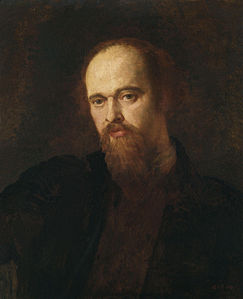Analysis of Sacred To the Memory of Algernon R. G. Stanhope
Dante Gabriel Rossetti 1828 (London) – 1882 (Birchington-on-Sea)
“THE silver cord is loosed,” he said,
“The golden bowl is broken;
A few more prayers having been prayed,
A few more love-words spoken,
I shall turn my face unto the wall,
And sleeping, not be woken.”
“Is it a better place, my child,
That thou art gone unto?
Upon this earth that thou hast left
Hadst thou not much to do?
Would not thy joys have been a crowd
And thy troubles small and few?
“Beauty and rank and friends and wealth,
Genius and excellence,—
Could not all these, thy heritage,
Win thee from hastening hence?
Was the soul so much more unto thee
Than joys of mind and sense?
“And, bending with an English grace,
The ladies of our isle,
With their soft curls and their virgin eyes
Which look so sweet the while,
Had given thee for thy nobleness
A precious golden smile.
“These will not now be thine: thy life's
Appointed period
Being past o'er, thou liest on
The folded pinions broad
Of the Seraph who is bearing thee
Up through the sun to God.
“It has a solemn sound—‘to God’;
And strange high thoughts it weaves
Of a garden where the Tree of Life
Its mystic shadow gives,
And the music of the rapid worlds
Is the wind that stirs the leaves.
“Surely, it is a better place:
Wealth shuts not there his ken
From woes his heart yearns to assuage;
Nor noble origin
Wounds him by lessening trust betwixt
Him and his fellow-men.
“Nor friends die from him, but instead
Come to him where he is;
Nor Passion, rank with evil joys
And worse satieties,
Pouting her crimson lips at him
Layeth her cheek to his.
“Nor priests be there, like a bad dream
That at your bed's foot stands
All night (and yet it goes at last);
Nor moans of king-curst lands
Make his breast heave and his pale brow
To drop into his hands.
“But Love walks always with him now;
And Faith, not chained but free;
And Hope, bent forward, and with hair
Held back continually
To hear the distant chariot-wheels;
And wise calm Charity.”
| Scheme | Text too long |
|---|---|
| Poetic Form | |
| Metre | 01011111 0101110 01111011 0111110 111111001 0101110 11010111 111110 01111111 111111 11111101 0110101 10010101 100100 11111100 1111001 101111101 111101 01011101 0101101 111101101 111101 1101111 010101 11111111 010100 10110111 01011 10111101 110111 11010111 011111 101010111 11011 001010101 1011101 10110101 111111 11111101 110100 111100101 101101 11111101 111111 11011101 011 10010111 10111 11111011 111111 11011111 111111 11110111 110111 1111111 011111 01110011 1101000 110101001 011100 |
| Closest metre | Iambic tetrameter |
| Characters | 1,934 |
| Words | 360 |
| Sentences | 14 |
| Stanzas | 1 |
| Stanza Lengths | 60 |
| Lines Amount | 60 |
| Letters per line (avg) | 25 |
| Words per line (avg) | 6 |
| Letters per stanza (avg) | 1,470 |
| Words per stanza (avg) | 354 |
Font size:
Submitted on May 13, 2011
Modified on March 05, 2023
- 1:49 min read
- 195 Views
Citation
Use the citation below to add this poem analysis to your bibliography:
Style:MLAChicagoAPA
"Sacred To the Memory of Algernon R. G. Stanhope" Poetry.com. STANDS4 LLC, 2024. Web. 27 Apr. 2024. <https://www.poetry.com/poem-analysis/7612/sacred-to-the-memory-of--algernon-r.-g.-stanhope>.


Discuss this Dante Gabriel Rossetti poem analysis with the community:
Report Comment
We're doing our best to make sure our content is useful, accurate and safe.
If by any chance you spot an inappropriate comment while navigating through our website please use this form to let us know, and we'll take care of it shortly.
Attachment
You need to be logged in to favorite.
Log In